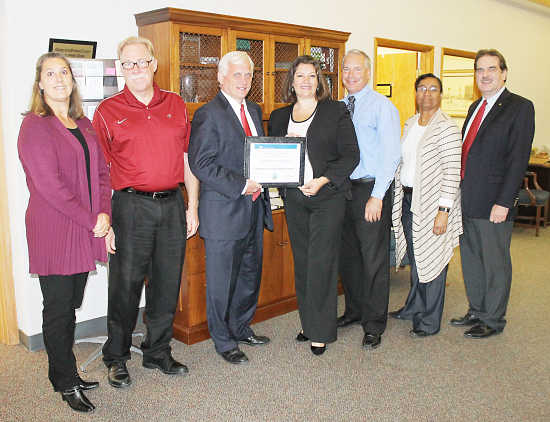Revolving loan fund to benefit local businesses

A new Greencastle/Putnam County Economic Development Center program should make it easier for local small businesses to grow even when a loan isn’t available through a traditional financial institution.
In a ceremony Wednesday morning, USDA officials presented a $90,000 Rural Business Development Grant to Development Center Director Kristin Clary.
The Rural Development funds will be used to establish the center’s revolving loan fund to assist small and emerging businesses in Putnam County.
USDA Rural Development State Director Philip Lehmkuhler and Business Program Specialist John Anthrop made the presentation Wednesday.
“I just want to congratulate you on receiving this $90,000,” Lehmkuhler said. “You’re doing the right thing supporting small businesses. The businesses you help in small communities — when they start here, they stay here.”
Clary was joined in accepting the grant by Development Center board members Laura Elsbrock, Bob Jedele, Liz Cheatham and Bill Dory.
Those board members represent a community that will not only benefit from the revolving loan program, but one that has already invested in it.
In addition to the $90,000 USDA grant, the program has been boosted by $10,000 from the City of Greencastle and $5,000 from the Development Center.
An additional $10,000 from Putnam County was the final piece of the puzzle, a move the Putnam County Commissioners voted unanimously to support on Monday.
The county money, drawn from economic development funds, brings the total for the fund to $125,000.
“We understand that sometimes small businesses are a risk,” Clary told the commissioners Monday. “But if we can infuse the money locally, that’s what we want to do.”
The risk of lending to small business is the impetus behind the program. Clary hopes the program can fund the very businesses that need funding the most, even when banks cannot provide the funds.
“Banks have different criteria and they can’t always loan to small businesses,” Clary said. “We want to keep the money local.”
As such, a loan review board has been established including three bank represenatives, Michael Clampitt of North Salem State Bank, Chase Haltom of First National Bank and Amy Trusty of PNC Bank, as well as Sue Murray of the National Center for College Costs and small business owner Eric Wolfe.
The board members should bring a variety of experiences to the table, although Clary emphasized that the bank representatives may occasionally have to remove their “banker’s hat” in lending to higher-risk ventures.
The program will provide loans of $2,000 to $25,000 to eligible Putnam County small businesses.
Several local businesses provided letters of support for the program. Clary said these businesses have also expressed interest in applying for funds.
Those interested in learning more about the revolving loan fund may contact the Greencastle/Putnam County Development Center at 653-2474.
